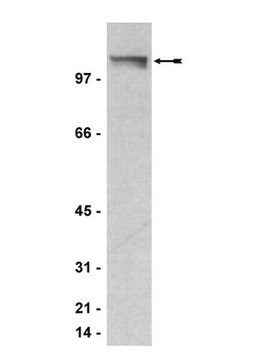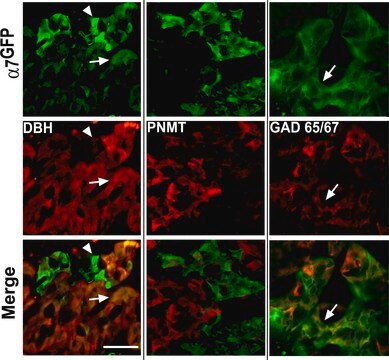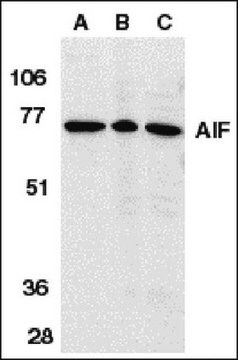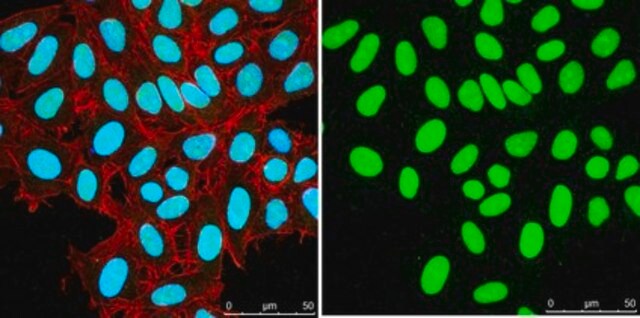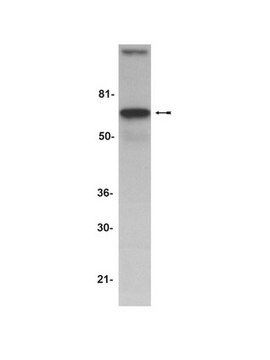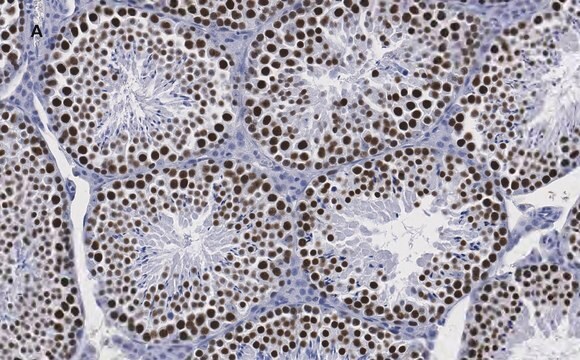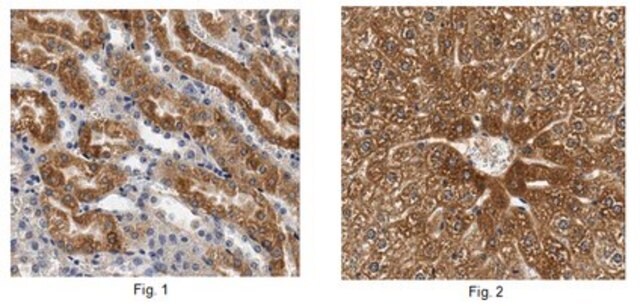AB16502
Anti-AIF Antibody, NT
Chemicon®, from rabbit
Synonym(s):
Apoptosis Inducing Factor
Sign Into View Organizational & Contract Pricing
All Photos(1)
About This Item
UNSPSC Code:
12352203
eCl@ss:
32160702
NACRES:
NA.41
Recommended Products
biological source
rabbit
Quality Level
antibody form
purified antibody
antibody product type
primary antibodies
clone
polyclonal
species reactivity
human
manufacturer/tradename
Chemicon®
technique(s)
western blot: suitable
NCBI accession no.
UniProt accession no.
shipped in
wet ice
target post-translational modification
unmodified
Gene Information
human ... AIFM1(9131)
Specificity
Apoptosis is characterized by several morphological nuclear changes including chromatin condensation and nuclear fragmentation. These changes are triggered by the activation of members of the caspase family, caspase activated DNase, and several novel proteins (Zamzami & Kroemer 1999). A novel gene, the product of which causes chromatin condensation and DNA fragmentation, was recently identified, cloned, and designated apoptosis inducing factor (AIF) (Susin et al. 1999). Like the critical molecules, cytochrome c and caspase 9, in apoptosis, AIF localizes in mitochondria. AIF translocates to the nucleus when apoptosis is induced and induces mitochondria to release the apoptogenic proteins, cytochrome c and caspase-9. AIF induces chromatin condensation and DNA fragmentation, which are the hallmarks of apoptosis, of the isolated nucleus and the nucleus in live cells by microinjection. AIF is highly conserved between human and mouse and is widely expressed (Susin et al. 1999).
Immunogen
Epitope: N-terminus
Rabbit anti-AIF (N-terminus of mature AIF) polyclonal antibody was raised against a peptide corresponding to amino acids 109 to 122 of human AIF (Susin et al. 1999).
Application
Research Category
Apoptosis & Cancer
Apoptosis & Cancer
Research Sub Category
Apoptosis - Additional
Apoptosis - Additional
This Anti-AIF Antibody, N-terminus is validated for use in WB for the detection of AIF.
Western blot: 0.25 to 1 μg/mL.
K562 cell lysate from HeLa cells can be used as a positive control and a 67 kDa band should be detected.
Optimal working dilutions must be determined by end user.
K562 cell lysate from HeLa cells can be used as a positive control and a 67 kDa band should be detected.
Optimal working dilutions must be determined by end user.
Linkage
Replaces: 04-430
Physical form
Format: Purified
Purified IgG by ion exchange chromatography. Liquid in PBS containing 0.02% sodium azide.
Storage and Stability
Maintain refrigerated at 2-8°C in undiluted aliquots for up to 12 months.
Other Notes
Concentration: Please refer to the Certificate of Analysis for the lot-specific concentration.
Legal Information
CHEMICON is a registered trademark of Merck KGaA, Darmstadt, Germany
Disclaimer
Unless otherwise stated in our catalog or other company documentation accompanying the product(s), our products are intended for research use only and are not to be used for any other purpose, which includes but is not limited to, unauthorized commercial uses, in vitro diagnostic uses, ex vivo or in vivo therapeutic uses or any type of consumption or application to humans or animals.
Not finding the right product?
Try our Product Selector Tool.
Storage Class Code
10 - Combustible liquids
WGK
WGK 2
Flash Point(F)
Not applicable
Flash Point(C)
Not applicable
Certificates of Analysis (COA)
Search for Certificates of Analysis (COA) by entering the products Lot/Batch Number. Lot and Batch Numbers can be found on a product’s label following the words ‘Lot’ or ‘Batch’.
Already Own This Product?
Find documentation for the products that you have recently purchased in the Document Library.
Zhonghua Cheng et al.
Bioengineered, 13(1), 1359-1376 (2022-01-12)
Gastric cancer (GC), one of the most prevalent malignancies across the world, has an increasing incidence rate. Long non-coding RNA (lncRNA) PURPL (also referred to as LINC01021) has been demonstrated to influence malignant GC behaviors and partake in other cancers.
Ke Zhang et al.
Molecular medicine reports, 12(3), 4415-4421 (2015-06-18)
Sepsis is one of the leading causes of mortality in severe systemic inflammatory syndrome. The endotoxin-induced inflammatory response has been linked to the development of sepsis. Rhein is a lipophilic anthraquinone isolated from Rheum rhabarbarum (rhubarb), which has a protective
Qinqin Lin et al.
Medical science monitor basic research, 22, 165-174 (2016-12-17)
BACKGROUND Aquaporin-2 (AQP2) plays a major role in water reabsorption in the renal collecting duct, and is involved in a variety of renal disease. Recent studies have indicate that sirtuin1 (SIRT1) exerts renoprotective properties against kidney diseases. This study aimed
The pathogenic role of the canonical Wnt pathway in age-related macular degeneration.
Zhou, T; Hu, Y; Chen, Y; Zhou, KK; Zhang, B; Gao, G; Ma, JX
Investigative Ophthalmology & Visual Science null
Keyu Ren et al.
Brazilian journal of medical and biological research = Revista brasileira de pesquisas medicas e biologicas, 51(6), e7065-e7065 (2018-04-26)
Ulcerative colitis is a chronic inflammatory disease of the colon where intestinal motility is disturbed. Interstitial cells of Cajal (ICC) are required to maintain normal intestinal motility. In the present study, we assessed the effect of tumor necrosis factor-alpha (TNF-α)
Our team of scientists has experience in all areas of research including Life Science, Material Science, Chemical Synthesis, Chromatography, Analytical and many others.
Contact Technical Service